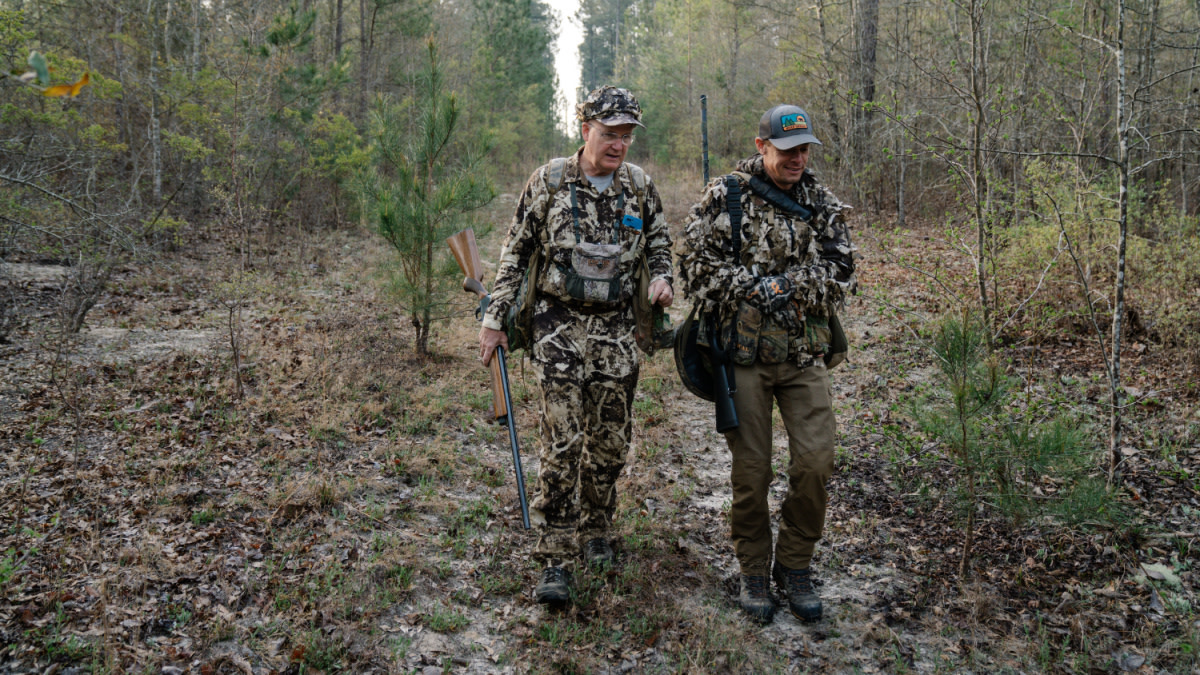
There are two sources of turkey hunting advice you should seek. The first is from the true experts—the people who have killed piles of birds in various situations, throughout different parts of the season, and with different weapons. They get bonus points if they’ve stacked up plenty of toms on public lands.
The second source is the turkeys themselves. When they tell you something, you should listen. This isn’t what we typically think of as true advice, but I don’t care. If anything is going to tell you how to be a better turkey hunter, it’s the birds themselves.
Trust Your Calling Tyler Jones and K.C. Smith host the popular hunting podcast, The Element. They also film hunts ranging from turkeys to elk and are adamant that neither one of them are turkey hunting experts. This is, according to Jones, one of the reasons why they try to hunt with people who really know what they’re doing.
“I hunted with Mitchell Johnston this year, who is a champion caller,” Jones said. "When he gets a quick response from a gobbler that isn’t too far away he finds a spot to set up. He doesn’t waste time because he trusts his calling.”
Many hunters don’t, but the best advice you can get regarding becoming a stone-cold turkey slayer is to learn to call well. Learn to sound like the birds and read each situation. This comes from practice, hunting with experienced callers, and listening to the birds themselves. It also involves understanding the turkeys' vocal range and how you can mimic it.
“One thing that really good turkey hunters seem to understand is how to call really softly,” Jones said. “If you learn to softly purr and cluck and sound like quiet hen-to-hen chatter, you’ll work more birds in. Every good turkey hunter I’ve ever shared the woods with has pushed that message.”
Decoy Lessons There are some decoy rules that are pretty ubiquitous across a wide variety of hunting situations. The more realistic, the better is one rule. Another is to match what’s going on with wild birds, like using more decoys early in the season, and fewer later.
Even following those loose rules, you’ll have birds flare and simply not commit. Jones dealt with that a few times this spring and realized that the best advice for decoy usage might be to adjust on the fly.
“We had a gobbler hang up at 90 yards in Tennessee,” Jones said. “He was sheepish, and then four jakes ran in and pushed him off. Having a quarter-strut jake decoy out actually worked against us on that bird. He probably would have committed if we only had hens out, even though the seasonal timing said a jake was the way to go.”
When the local birds tell you what they want out of your setup, it’s best to listen.
Just Get Experience “I’m not a good turkey hunter,” Smith said. “I don’t have the experience, so I’m like a sponge when I hunt with good turkey hunters. One of my buddies who is a great turkey hunter told me this spring that you just have to mix it up with the birds. You have to call to them, interact with them, and just learn how to read their mood.”
This is some of the best advice you’ll ever hear. Just spend time with the turkeys. Scout before the season, pay attention to what they say to one another when they walk past your treestand in the fall, and learn from their behavior any chance you can throughout the spring.
While this will be wildly unpopular, I’ll offer up some parting advice from my own world. After killing dozens of birds with shotguns over the years, I started mostly bowhunting turkeys. Talking birds into a spread at sub-10-yard distances is a different challenge, and you learn a lot about what makes a bird commit or bail.
This has changed how I hunt and definitely made me re-think my run-and-gun strategies. I’m more patient because of it, and I trust my setups a lot more. The urge to abandon every setup after 45 minutes of downtime is gone. Solid advice is great, but it’s no substitute for experience.
Conclusion You likely started this article looking for something like, “yelp three times at sunrise and shut up.” But that isn’t how this works. There are too many variables in individual hunting situations to make blanket statements.
The best you get is this: try to spend time in the woods with someone who knows how to be successful (and often is). Then get around the birds and let them advise you on how to proceed through each encounter. Do these two things enough and you won’t need any more turkey hunting advice from anyone, ever.






